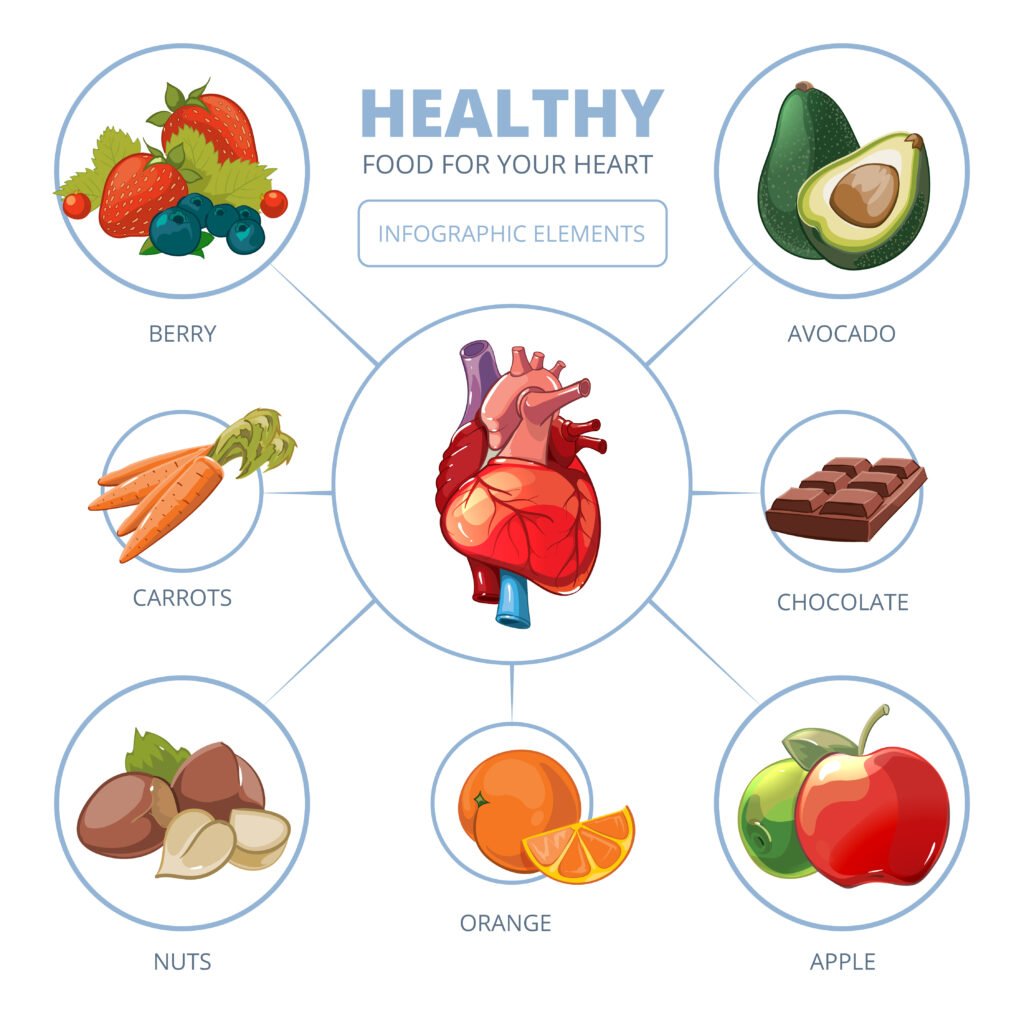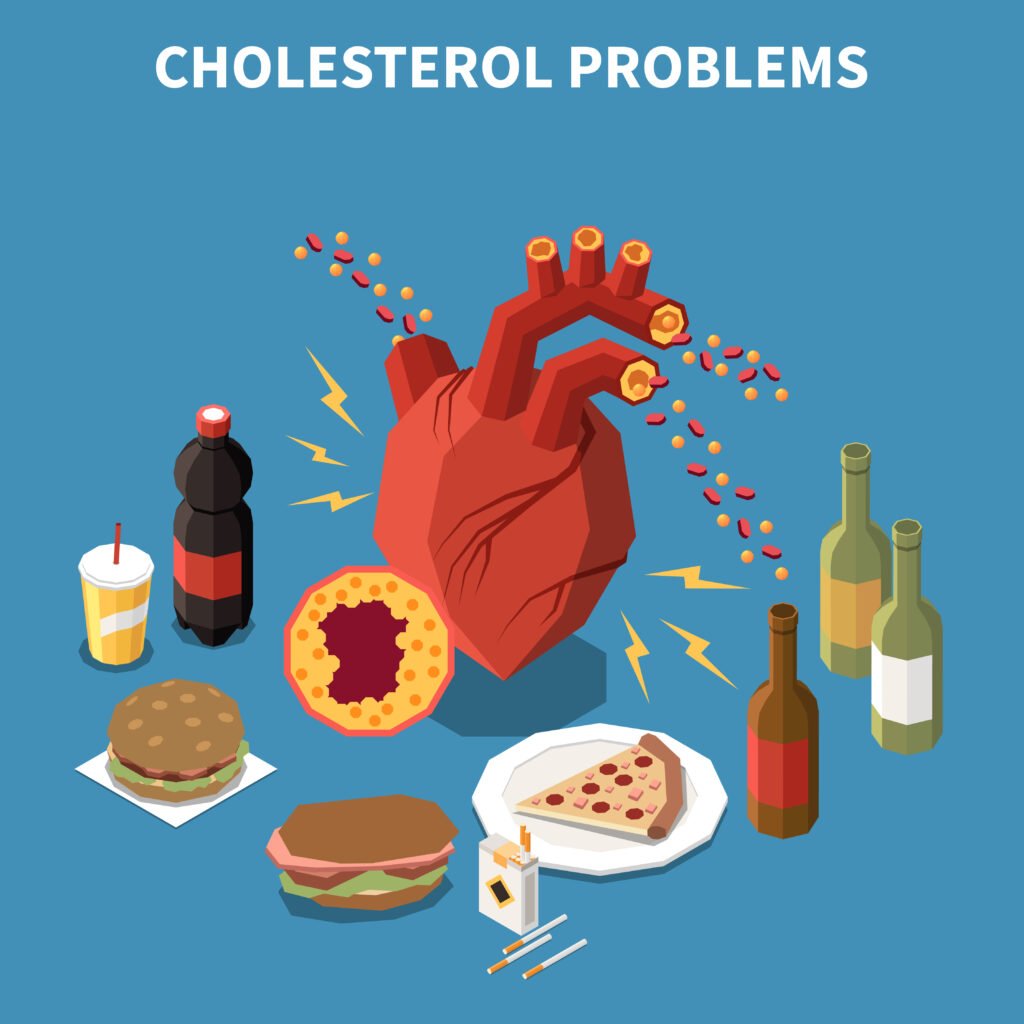
Keto and Heart Health
In recent years, the ketogenic diet has gained popularity not just for weight loss but also for its potential benefits to heart health. In this article, we’ll explore the relationship between Keto and cardiovascular well-being, shedding light on key insights, potential advantages, and considerations for those looking to support a healthy heart.
1. Understanding the Basics: What is the Keto Diet?

Before we delve into the impact of Keto on heart health, let’s grasp the basics of the ketogenic diet. Keto is a low-carbohydrate, high-fat diet that prompts the body to enter a state of ketosis. During ketosis, the body shifts from relying on carbohydrates for energy to burning fats, which are converted into ketones. Now, let’s explore how this dietary approach may influence heart health positively.
2. The Heart-Healthy Fats in Keto

Contrary to common misconceptions, not all fats are created equal. The ketogenic diet emphasizes healthy fats, such as avocados, olive oil, and nuts, which are known for their positive impact on heart health. These fats may help improve cholesterol levels by increasing high-density lipoprotein (HDL) and lowering low-density lipoprotein (LDL).
3. Keto and Weight Management: A Key Player in Heart Health

Maintaining a healthy weight is crucial for heart health, and Keto has shown promise in supporting weight loss. By reducing carbohydrate intake and promoting the utilization of stored fat for energy, the ketogenic diet may aid in weight management, potentially reducing the risk of heart-related issues.
4. Influence on Blood Pressure: What the Research Says

High blood pressure is a significant risk factor for heart disease. Some studies suggest that the ketogenic diet may have a positive impact on blood pressure levels. By reducing refined carbohydrates and processed foods, Keto may contribute to lower blood pressure, enhancing cardiovascular well-being.
5. Keto and Inflammation: A Silent Contributor to Heart Disease

Chronic inflammation is increasingly recognized as a contributor to heart disease. The ketogenic diet has been proposed to have anti-inflammatory effects, potentially reducing inflammation markers linked to cardiovascular issues. Foods rich in omega-3 fatty acids, common in the Keto diet, also play a role in mitigating inflammation.
6. Balancing Macronutrients on Keto for Heart Health

Achieving a balanced macronutrient profile is crucial for overall health. While the ketogenic diet is high in fats, it’s essential to include an adequate amount of quality proteins and non-starchy vegetables. Striking this balance ensures a well-rounded nutritional approach that supports heart health.
7. Keto-Friendly Foods for a Healthy Heart

Opting for heart-friendly foods within the ketogenic framework is key. Incorporating fatty fish, lean proteins, leafy greens, and antioxidant-rich vegetables ensures that you’re not only following Keto principles but also nourishing your heart with essential nutrients.
8. Keto and Blood Sugar Regulation: A Positive Impact on Heart Health

Dive into the connection between the ketogenic diet and blood sugar control. Learn how Keto’s focus on low-carb, high-fat foods may contribute to stable blood sugar levels, potentially reducing the risk of heart-related complications.
9. The Role of Ketones in Heart Health: Beyond Weight Loss

Ketones, the byproducts of fat metabolism during ketosis, may have broader implications for heart health. Explore how these compounds might offer cardiovascular benefits beyond weight loss, providing a deeper understanding of Keto’s impact.
10. Keto and Lipid Profiles: Navigating Cholesterol for Heart Well-being
Delve into the nuanced relationship between the ketogenic diet and lipid profiles. Uncover how Keto may influence cholesterol levels, with a focus on the interplay between HDL, LDL, and triglycerides for optimal heart well-being.
11. Potential Risks and Considerations: A Balanced View of Keto for Heart Health
While exploring the potential benefits, it’s crucial to acknowledge potential risks. Examine the considerations and precautions individuals should be aware of when incorporating the ketogenic diet into their lifestyle, ensuring a well-informed approach to heart health.
12. Personalizing Keto for Heart Wellness: Tailoring the Approach
Recognize the importance of personalization in adopting Keto for heart wellness. Explore how individual factors such as age, existing health conditions, and genetic predispositions should influence the customization of a ketogenic approach to best support heart health.
13. Keto-Friendly Recipes for Heart Health: Balancing Flavor and Nutrition

Discover a collection of heart-healthy recipes within the ketogenic framework. From nutrient-dense salads to satisfying main dishes, these recipes showcase the intersection of delicious flavors and cardiovascular support on the Keto journey.
14. The Science Behind Keto and Heart Health: Breaking Down the Research
Take a deep dive into the scientific studies and research supporting the relationship between Keto and heart health. Gain insights into the methodologies, findings, and ongoing investigations that contribute to our understanding of this intriguing connection.
15. Long-Term Sustainability: Can Keto Support Heart Health Over Time?
Explore the question of long-term sustainability regarding Keto’s impact on heart health. Investigate whether the ketogenic lifestyle can be maintained effectively over the years, providing enduring cardiovascular benefits.
Continue your exploration of Keto and heart health with these additional headings, each offering a unique perspective on the relationship between the ketogenic diet and maintaining a strong and resilient heart.
Conclusion
In conclusion, the intersection of Keto and heart health reveals a fascinating landscape of potential benefits and considerations. The ketogenic diet, known for its efficacy in weight loss, showcases promising connections to cardiovascular well-being that extend beyond mere pounds shed. As we’ve explored various facets, it becomes evident that Keto’s impact on heart health involves a complex interplay of factors.
The emphasis on heart-healthy fats, such as those found in avocados and olive oil, forms a cornerstone of the ketogenic approach. By incorporating these fats and adopting a balanced macronutrient profile, individuals may create a dietary environment that supports stable blood sugar levels and favorable lipid profiles. These factors contribute to a holistic cardiovascular strategy that extends beyond weight management.
Moreover, the anti-inflammatory potential of the ketogenic diet introduces another layer of significance. Chronic inflammation is increasingly recognized as a contributor to heart disease, and by adopting a diet rich in omega-3 fatty acids and low in inflammatory triggers, individuals may mitigate this risk and promote heart health.
In the end, the relationship between Keto and heart health represents a dynamic field of exploration. While promising, it’s essential to approach it with awareness, and understanding that individual responses may vary. As science continues to unravel the intricacies, one thing remains clear – a heart-healthy approach to Keto involves not just what you eat but how you navigate this dietary journey, ensuring a robust and resilient cardiovascular foundation for years to come.
People also ask
Transform Your Body: 15 Keto Weight Loss Before and After Successes
Nourish and Indulge: 15 Keto Snack Ideas You’ll Love
Gather ‘Round: 30 Keto Dinner Ideas For Family Will Love
FAQS
Is the ketogenic diet safe for heart health?
In general, the ketogenic diet appears to have potential benefits for heart health, especially concerning weight management and blood sugar control. However, it’s crucial to consult with healthcare professionals, as individual responses may vary.
Can Keto help with high blood pressure?
Some studies suggest that the ketogenic diet may have a positive impact on blood pressure levels. By reducing refined carbohydrates and processed foods, it may contribute to lower blood pressure. Nonetheless, individual health factors should be considered.
What role do healthy fats play in Keto and heart health?
Healthy fats, such as those found in avocados and olive oil, are integral to the ketogenic diet. They may contribute to improved cholesterol levels, with an increase in high-density lipoprotein (HDL) and a decrease in low-density lipoprotein (LDL).
Can the ketogenic diet reduce inflammation for heart health?
Yes, the ketogenic diet is believed to have anti-inflammatory effects, potentially reducing markers of inflammation associated with heart disease. Foods rich in omega-3 fatty acids, commonly found in Keto, also contribute to anti-inflammatory benefits.
Are there risks associated with Keto and heart health?
While Keto may offer potential benefits, it’s important to acknowledge potential risks. These may include nutritional deficiencies if not well-planned, and individual health conditions must be taken into account.
How does the ketogenic diet affect blood sugar levels?
The ketogenic diet is designed to promote stable blood sugar levels by minimizing carbohydrate intake. This may be beneficial for those looking to manage or prevent conditions related to blood sugar dysregulation.
Is the ketogenic diet suitable for long-term heart health?
The sustainability of the ketogenic diet over the long term is an ongoing area of research. While it may offer lasting cardiovascular benefits, individual preferences and health considerations play a role in long-term adherence.
Can Keto support weight loss, and is that beneficial for heart health?
Yes, the ketogenic diet has shown efficacy in weight loss, and maintaining a healthy weight is crucial for heart health. By promoting the use of stored fat for energy, Keto may contribute to weight management.
What are some heart-healthy recipes within the ketogenic diet?
Heart-healthy recipes within Keto include those featuring fatty fish, lean proteins, leafy greens, and antioxidant-rich vegetables. These recipes balance delicious flavors with essential nutrients for cardiovascular support.
Should I consult a healthcare professional before starting Keto for heart health?
Absolutely. Before making significant dietary changes, especially concerning heart health, it’s essential to consult with healthcare professionals. They can provide personalized guidance based on your health status and goals.









